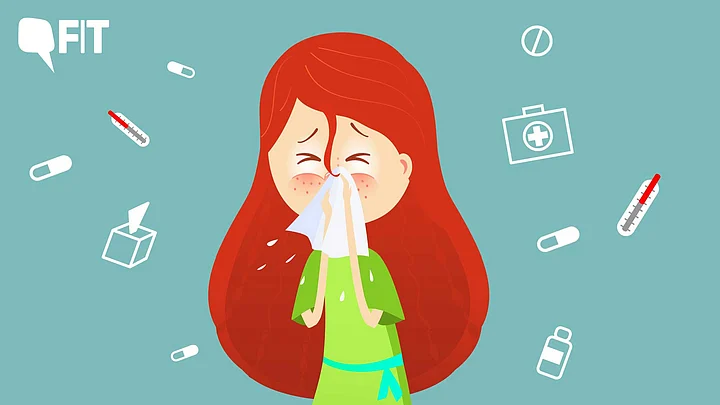Brace yourself, it's allergy season. Which means, its the season for sniffles, itchy eyes, and sneezes after sneezes.
Every year, as the sweltering heat gives way to winter, the changing weather in October brings with it dust, pollen, and viruses that lead to a surge in flu-like symptoms - collectively known as hay fever, or rhinitis.
What are some symptoms to look out for? How can you tell if its allergies, the flu, or COVID? Can certain foods help curb the symptoms?
FIT speaks to experts to bring you the 411 so you can be a step ahead of the allergy season.
What causes allergies this time of the year?
Allergies are basically caused by hyper-reactions of your immune system to external stimuli.
These allergy causing stimuli are typically pollen, spores, dust mites, and mold, says Dr Mukesh Mehra, Director internal Medicine, Max hospital.
Dr Rahul Sharma, an Allergist, and the Additional Director, Pulmonology, Fortis Hospital Noida, tells FIT that the reason we see a surge in allergies at this time of the year is because "this is the season when pollen grows, there is also dampness in the air, more humidity, and air pollution."
I never got allergies in this season before, why am I getting them now?
It is possible to develop allergies later in life too. Because they are governed by your immuno-modulation, if there is any kind of fluctuation in the immunity, it can lead to these types of allergies, explains Dr Sharma.
"This can manifest at any point of time," he reiterates.
"We have been seeing that, in the post COVID era, people who have either suffered COVID infection, or had sub-clinical treatment, we are seeing a 20 to 30 percent rise in allergies in these patients."Dr Rahul Sharma, Allergist, Additional Director, Pulmonology, Fortis Hospital
What does climate change have to do with seasonal allergies?
Mounting evidence suggests that allergy season has been getting longer and more intense thanks to climate change.
This is because rising temperatures, and rising carbon dioxide emissions helps boost pollen production, and therefore increasing the duration and intensity of pollen allergies.
Common symptoms of allergies?
According to the experts we spoke to, the most common symptoms of seasonal allergies are,
Continuous sneezing
Runny or stuffy nose
Watery, red and itchy eyes
Itchy sinuses, throat, or ear canals
Ear congestion
Some other less common symptoms include,
Headaches
Dry coughing
Shortness of breath
Fatigue
Is it allergies, the flu, or COVID-19?
Because the symptoms of seasonal allergies can overlap with those of the flu, and even COVID, it can be hard to differentiate between the three just by symptoms.
The easiest way to know if you have COVID is to take an RT-PCR test.
As for distinguishing between allergies and the flu, Dr Mehra says "with allergy, you are less likely to have fever. It’s a seasonal phenomenon."
Flu on the other hand, he explains "is generally accompanied by fever, body pain, and myalgia."
"Flu is also transient, and lasts around 4 - 5 days. Symptoms of seasonal allergies generally last on and off all of the season."Dr Mukesh Mehra, Director, Internal Medicine, Max hospital
What should you do if you're having allergy symptoms?
The first step is to know what specifically is causing the allergy. Then, try and minimize your exposure to these allergens, says Dr Mehra.
If you are repeatedly having these allergic symptoms, "go and see a doctor," says Dr Sharma, So that you can rule out chronic inflammation in your lungs and nose.
If it is an allergic reaction, a doctor will be able to help you figure out the source of it, and which part of your body is affected, he adds.
Are there any treatments that can help relieve these symptoms?
Allergy pills, nasal sprays, and saline nasal washes, eye drops can help sooth symptoms like itchy nose, sniffles, and sneezing, says Dr Mehra.
Can you prevent seasonal allergies?
"Certain anti-allergen stabiliser drugs taken a few days before the allergy season starts can help control the symptoms," says Dr Mukesh Mehra, Director, Internal Medicine, Max hospital.
Some lifestyle measures that can help prevent, or atleast minimise symptoms are,
Avoid fasting
Avoid smoking
Get the flu vaccine and pneumococcal vaccine if you can
Can some foods help curb seasonal allergies?
There are no particular foods that target symptoms of seasonal allergies, however, keeping your immunity up is the key to fighting these symptoms.
"We need to understand that this is a result of immuno-modulation so directly or indirectly, if we can sort out our immunity by having antioxidants, citrus fruits, and a balanced diet, we can keep our immune system in check and we will have less symptoms."Dr Rahul Sharma, Allergist, Additional Director, Pulmonology, Fortis Hospital

